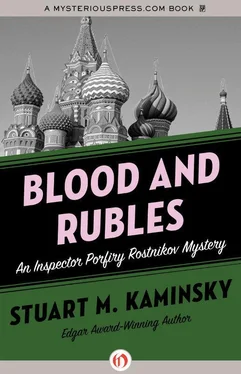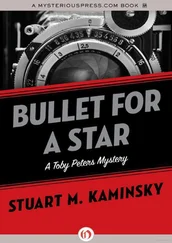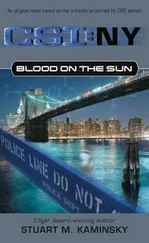Stuart Kaminsky - Blood and Rubles
Здесь есть возможность читать онлайн «Stuart Kaminsky - Blood and Rubles» весь текст электронной книги совершенно бесплатно (целиком полную версию без сокращений). В некоторых случаях можно слушать аудио, скачать через торрент в формате fb2 и присутствует краткое содержание. Год выпуска: 2012, Жанр: Полицейский детектив, на английском языке. Описание произведения, (предисловие) а так же отзывы посетителей доступны на портале библиотеки ЛибКат.
- Название:Blood and Rubles
- Автор:
- Жанр:
- Год:2012
- ISBN:нет данных
- Рейтинг книги:3 / 5. Голосов: 1
-
Избранное:Добавить в избранное
- Отзывы:
-
Ваша оценка:
- 60
- 1
- 2
- 3
- 4
- 5
Blood and Rubles: краткое содержание, описание и аннотация
Предлагаем к чтению аннотацию, описание, краткое содержание или предисловие (зависит от того, что написал сам автор книги «Blood and Rubles»). Если вы не нашли необходимую информацию о книге — напишите в комментариях, мы постараемся отыскать её.
Blood and Rubles — читать онлайн бесплатно полную книгу (весь текст) целиком
Ниже представлен текст книги, разбитый по страницам. Система сохранения места последней прочитанной страницы, позволяет с удобством читать онлайн бесплатно книгу «Blood and Rubles», без необходимости каждый раз заново искать на чём Вы остановились. Поставьте закладку, и сможете в любой момент перейти на страницу, на которой закончили чтение.
Интервал:
Закладка:
Although he was wearing his boots, the colonel managed to walk lightly and quietly out the door.
“Is he gone?” whispered Tkach, eyes still closed.
“Yes,” Rostnikov answered.
“Good,” Tkach said, opening his eyes.
He looked in the general direction of Rostnikov, found him, tried to turn his head, felt a swift pain, and closed his eyes again. “I didn’t know what to say to him,” said Tkach. “I couldn’t carry on a conversation.”
“That is understandable,” said Rostnikov.
Tkach’s arms were lying at his sides over the thin orange blanket that covered him. One hand moved toward his head. There was pain in Tkach’s face. Rostnikov intercepted the hand and put it back at his side.
“My head,” said Tkach.
“I’ll ask a doctor to give you something for the pain,” said Rostnikov, realizing that he was still holding the young man’s hand.
“That would be welcome,” said Tkach, eyes still closed. “Zelach just left. He saved my life.”
“The colonel just told me.”
Tkach tried to shake his head but found it impossibly painful, so he simply slumped back and licked his lips. “I think I should sleep now,” he said. “I had little sleep last night.”
“I’ll be back later,” said Rostnikov.
“No need,” said Tkach dreamily.
“I’ll be back,” said Rostnikov, and then he left.
At the desk in the corridor he told the plain-looking nurse with the glasses that Tkach needed something for his pain. She said she would find a doctor.
It was dawn when Rostnikov hit the street. It was definitely cold, not as cold as it would be in a month, but it was certainly Nahyahbr, November, and cold enough for snow. This was Rostnikov’s weather. His leg hurt less in the cold; it often went quite pleasingly numb for brief stretches in the winter.
He got in the car and checked his watch. It was a little after six, a very unreasonable hour for a social call. He gave the driver the address of the Porvinovich apartment building and leaned back to get a few minutes of rest as she pulled into the early-morning traffic.
Emil Karpo recognized the building on Vozdvishenka, the Street of the Exaltation of the Cross, which, along with the Noviy Arbat, New Arbat, was still called by most Muscovites Kalinin Prospekt, in honor of Mikhail Kalinin, one of the few old Bolsheviks to survive the purges of Stalin and die an honored old man in 1946. The apartment building, a one-block walk from the Praga Restaurant, dated back to the turn of the century and therefore was much sturdier and well built than the skyscrapers that had come after the war against the Nazis. It had originally, though briefly, housed large apartments for those in the czar’s ministries. Then, until recently, it had housed members of the president’s cabinet and high-ranking members of the politburo, along with a sprinkling of bankers. Now it housed the newly rich and influential, men such as Igor Kuzen.
Hamilton had admired the building as they walked toward it from the FBI agent’s dark Ford, which was parked quite illegally with the flap down, indicating that he was there on police business.
It was a few minutes after six in the morning.
There was a man on guard at the locked door. He was dressed in a dark suit and tie, and his battered face looked formidable. Karpo showed his identification card. Hamilton took out his FBI photo ID. The man with the battered face reluctantly opened the door.
“Igor Kuzen,” said Hamilton.
The man was not accustomed to black men, particularly those who showed cards and acted with such confidence. The policeman with him was as chilling a pale specimen of humanity as he had ever seen, and he had seen a great many in his life.
“He is probably not yet up,” the man said. “He seldom rises before eight or nine.”
“Unfortunately,” said Hamilton, “we will have to disturb his routine. His room number?”
The man with the battered face was confused. He looked back into the lobby, from which a large man emerged. The large man wore black pants and shoes and a white long-sleeved turtleneck shirt under his jacket. He was completely bald.
“Is there a problem, Georgi?” the man in the turtleneck asked.
He was big, very big, and Karpo could see that the backs of both his hands were tattooed.
“These men want to see Mr. Kuzen,” the battered man said. “They are from the police.”
This information did not appear to impress the big man.
“You will have to come back later,” the man said. “Mr. Kuzen is not up yet. Give me your names and numbers and I will ask him to call you when he gets up.”
“We would like to see him now,” Hamilton said.
“Out of the question,” said the big man, now standing directly in front of Hamilton.
“I’ll have to ask you to step out of our way or be arrested for obstructing a criminal investigation,” said Hamilton, meeting the man’s eyes.
The big man smiled.
Hamilton’s left leg shot out and came back behind the left knee of the big man, who started to crumple to the ground as he reached under his jacket. Hamilton’s right hand brought the reaching hand backward, fingers almost touching the man’s wrist. With his other hand Hamilton reached under the now-kneeling man’s jacket and came up with a pistol, which he handed to Karpo, who stood watching without emotion.
“What room is Mr. Kuzen in?” Hamilton asked, releasing the fallen man’s hand and straightening his tie.
The man with the battered face looked at the kneeling man, who gave him no help. The kneeling man was nursing a very sore knee and a very numb right hand.
“Sixty-three,” said the battered man.
The big man in the white turtleneck with no gun tried to stand, but his left leg wouldn’t cooperate.
“Impressive,” said Karpo as the two men went to the open elevator, and the man with the battered face went to help the fallen giant.
“Thank you,” said Hamilton, not knowing whether Karpo was capable of sarcasm. “What would you have done?”
“Sudden, quick palm to the bridge of his nose,” Karpo said, getting on the elevator.
“You might have driven the broken bone into his brain,” said Hamilton.
“It would be a possibility,” Karpo agreed as the elevator doors closed.
The door to room 63 was opening just as they arrived. The man with the battered face had undoubtedly alerted Kuzen to the arrival of the unwanted visitors.
“It’s early,” said the drowsy man, standing in the doorway.
He was around fifty, a small man with a bit of a belly and thinning gray hair, which looked a bit morning-wild. He wore thick glasses and green pajamas, which were probably silk. He stepped back from the open door and invited the two men in.
“Georgi tells me you’ve hurt Karono,” he said, closing the door.
Neither Hamilton nor Karpo said anything.
They were in a reception room with white walls and gold baseboards along the floor. A painting stood over an antique telephone table.
“This way,” the man said, scratching his head and moving down the corridor to a room on his right. “You want coffee? Tea? Something to eat?”
“No,” said Hamilton.
They followed the man into a huge room with a broad window looking out toward the city. The sun had risen over the roofs of the clearly visible towers of Saint Basil’s.
The room was furnished with delicate, turn-of-the-century furniture that looked quite authentic to Karpo.
“I started coffee when Georgi’s call woke me,” the man said. “I need a cup to wake up.”
“You are Igor Kuzen?” Hamilton asked.
“I am,” he said. “And I’m much more impressive when I’m fully dressed. Have a seat. Excuse me for one moment only.”
Читать дальшеИнтервал:
Закладка:
Похожие книги на «Blood and Rubles»
Представляем Вашему вниманию похожие книги на «Blood and Rubles» списком для выбора. Мы отобрали схожую по названию и смыслу литературу в надежде предоставить читателям больше вариантов отыскать новые, интересные, ещё непрочитанные произведения.
Обсуждение, отзывы о книге «Blood and Rubles» и просто собственные мнения читателей. Оставьте ваши комментарии, напишите, что Вы думаете о произведении, его смысле или главных героях. Укажите что конкретно понравилось, а что нет, и почему Вы так считаете.












